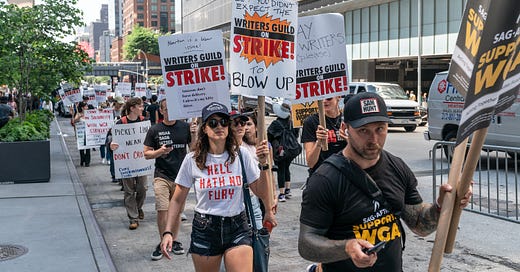If Hollywood Bosses Want War, Maybe They Should Get It
Studio execs want to break the WGA strike by forcing writers from their homes. It's worth remembering both sides can play that game.
In 2010, a group of 400 auto workers at the Allied Nippon facility in Ghaziabad, India, beat one of their bosses to death with iron rods after a contentious dispute over a planned strike and recent layoffs. Accounts of who started the violence differ: the executives claim that they fired pistols to defend themselves from the mob; the police and workers’ unions say the fight was instigated when executives fired their weapons into the air, setting off the mob. This kind of violence is uncommon but not unheard of in some regions of the world, where labor conditions often include a callous brutality that makes almost any response feel proportional. In 2012, for instance, 700 workers at a tea farm in Assam, in northeastern India, armed themselves, surrounded their boss’s bungalow, and set it on fire, burning him and his wife alive while preventing police from coming to their rescue.
“They deserved to be killed as the planter has exploited us for a long time and tortured us for petty things,” a woman who worked on the farm reportedly told local TV channel shortly after.
These cases are drastic outliers, of course. The current structure of U.S. society does not, for the most part, accommodate conditions in which extreme and direct interpersonal violence is a solution to labor disputes—we have too many cops and too many courts and too many little tiny luxuries and myths that keep people who are being abused by their bosses from truly retaliating against the people responsible for their pain. This is arguably a good thing; as we well know, it takes an enormous amount of violence leveled by those at the top to create rifts in the social contract wide enough that the people below them rise up, and the process of getting there is inevitably brutal, messy, and tragic. But, man. The leaders of many U.S. industries aren’t shy about toeing the line.
Keep reading with a 7-day free trial
Subscribe to Discourse Blog to keep reading this post and get 7 days of free access to the full post archives.





